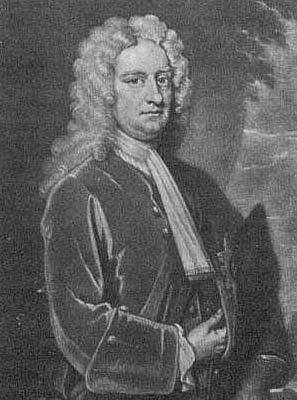Charles Spencer, 3rd Earl of Sunderland
Charles Spencer, 3rd Earl of Sunderland (* 1674, † April 9, 1722 in London ) was an English politician and statesman who was best known for his involvement in the South Sea Bubble (South Sea Bubble ), the first great stock market crash of European history.
Life
Charles Spencer was the second son of Robert Spencer, 2nd Earl of Sunderland. He was the heir to the peerage by the death of his older brother Henry in September 1688 in Paris. Charles, John Evelyn had called " rise to extraordinary hope", studied in Utrecht in 1695 and drew a Tiverton to the English House of Commons. In the same year he married Lady Arabella Cavendish, the daughter of Henry Cavendish, 2nd Duke of Newcastle. Arabella died in 1698 and Charles married in 1700 Anna Churchill, daughter of the famous John Churchill, 1st Duke of Marlborough. This compound was for Sunderland and his descendants of great importance. Through them he came into contact with the policies and through them came the title of the Duke of Marlborough to the Spencers, the later Spencer-Churchill called themselves. All subsequent Dukes of Marlborough, whose most famous descendant was the future Prime Minister Winston Churchill, and the Earl Spencer, whose most famous descendant was known as Lady Di Diana Frances Spencer, originate from this compound.
After Spencer was in 1702 followed his father in the peerage, he was a member of the Commission, which negotiated the union between the Kingdoms of England and Scotland. In 1705 he was sent as envoy extraordinary to Vienna.
Spencer's main interest was introduced as a bill peerage law (English peerage bill ), which aimed to limit the number of members of the Upper House, and - at least partially - to the opposition of Sir Robert Walpole failed. He still stood at the head of the government, as the South Sea Bubble collapsed hundreds of businessmen and aristocrats into bankruptcy. This affair was the political ruin for Spencer. Although he was involved in the introduction of the system, but had not even financially benefited. Nevertheless, public opinion was against him and it was only the influence of Robert Walpole's thanks to them that the House acquitted him when the matter was investigated.
In April 1721 the Earl of Sunderland resigned from all offices, but retained his influence on King George until his death on 8 April 1722.
Spencer had inherited his father's penchant for intrigue and repulsive manners, but he was far superior to his unselfishness and his contemporaries had a keen and critical mind. Since an early age he had a passion for books. He used his free time and his fortune to build a great library at Althorp, which in 1703 referred to as " best in Europe ". Part of it came in 1749 to Blenheim Palace.
Anne Churchill, his second wife, was, died of considerable influence on the political life of their time in April 1716 after a lifetime. The following year, the Earl 's rich Irish Judith Tichborne married his third wife († 1749). With Lady Anne Churchill, he had three sons and two daughters. The eldest son, Robert (1701-1729), succeeded him in 1722 as 4th Earl and the second son, Charles ( 1706-1758 ), 1729 the 5th Earl. 1733 Charles inherited the Dukedom of Marlborough and transferred the sunderlandschen goods to his brother John, the father of the first Earl Spencer.
1693, at the age of 18, he entered into a love affair with the London beau Edward Wilson. Henceforth he led a double life. The affair, however, and flew on Spencer was blackmailed. No way out of this unpleasant situation for him seeing he finally took his life in 1722. In Spencer, the English term " queer" is (actually english for flowering, counterfeit money ) for " homosexual" back, because he was of the English public as a counterfeiter in memory - on the one hand because of the out of him double life and on the other hand, because of what he as First Lord of the Treasury undertaken attempt to introduce worthless paper money in England, which many citizens were deprived of their property.









_by_Henry_Pierce_Bone.jpg)
